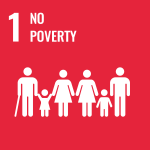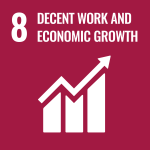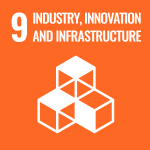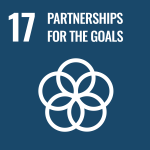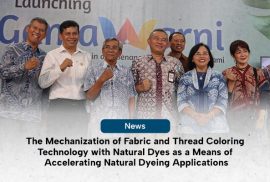
To date, Indonesia still utilizes and imports synthetic dyes for textiles in large capacity. On the other hand, Indonesia boasts a cultural tradition of employing natural dyes, known for their significant benefits to bodily well-being. In addition, Indonesia also has abundant natural resources and biodiversity—the source of raw material for natural dyes, although unfortunately so far it has not been well-exploited. On the other hand, the era of globalization is marked by the existence of free markets in the world, the place where all products are superior, competitive, and use environmentally friendly technology. Products with natural dyes can meet such specifications, thus having a promising opportunity to compete in the world market. Therefore, efforts to produce and recycle natural dyes are imperative to minimize the usage of hazardous synthetic dyes and reduce the importation of synthetic colorants.
There are four key factors for sustainable economic development, namely: 1) investment or capital; 2) human resources; 3) natural resources; and 4) technology. When compared to such factors, it can be said that the natural dye industry in Indonesia is very strong in factors 1 to 3. Nevertheless, there remains one factor that needs to be enhanced in the context of the production of natural dyes, which is the pillar of technology.
The multidisciplinary researchers of natural dye UGM united at the Indonesia Natural Dye Institute (INDI UGM). The existence of this institution is intended to contribute to the improvement of the pillar of technology for the production of natural dyes. INDI UGM has a vision of becoming a means and reference for education, research, development, and the procurement of natural dyes for healthy (human-environment) and prosperous (economically independent) Indonesia. INDI UGM has received appreciation from many parties, among them is consolidation as the Center of Excellence of IPTEKS Colleges (PUI-PT) in the field of natural coloring by DIKTI (2021-2023), as well as consolidation as UNESCO Chair on Research and Education of Local Natural Dyes (April 2023).
The INDI UGM institute is currently engaged in research and development endeavours pertaining to a machine known as GamaWarni, designed for the utilization of natural dyes. The research has two long-term objectives, namely: 1) can be produced with a standard natural dyeing on a commercial scale that is competitive with synthetic dyes; and 2) can apply natural dyeing on the scale of the craftsman (manual) and industrial (mechanical). The specific objectives of this research are to produce natural dyes suitable for dyeing fabrics and threads with machines, compile the specifications of the natural dyes, make a machine for dyeing fabric and thread with natural dyes, apply the natural dyes to manual dyeing in textiles and thread, and obtain HKI on these research results.
The research is scheduled to span a duration of three years, guided by the background, objectives, and directives outlined by Rispro Commercial. The stages of activity in the three years are as follows: 1) making a fabric dyeing machine with natural dye with reference to the manual-dyeing technique and mechanization studies carried out in the partner industry; 2) measuring and testing the quality and speed of production with testing criteria based on the quality of the coloring product, the speed of the production, and the ease of workers in the operation of the machine; 3) perfectioning the machine that has been produced and tested to meet the quality parameters of the product; 4) testing the machine and natural dyes produced by one of the industries owned by H&M’s partner; 5) making manuals and complete specifications for the machine and natural dyes; 6) compiling certification documents for natural dyeing and the machine; 7) obtaining patents and scientific publications; 8) compiling marketing cooperation documents; 9) compiling production and marketing documentation of natural dyeing and the machine; and 10) products and natural dyeing machine launching.

To achieve such purposes, a multidisciplinary research team is formed, which consists of: 1) the Chemical Engineering Study Program of UGM with specialization in the production of natural dyes and dyeing technologies; 2) the Mechanical Design and Machinery Study Program of ATMI Solo Polytechnic with specialization in mechanical engineering and workshop management; as well as 3) the Engineering and Industry Engineering Study Program of UGM with industrial-ergonomic and productivity engineering specialization. On the other hand, the selected industry partners are: 1) PT ATMI Solo which is engaged in precision parts, machinery, sheet metal fabrication, and special purpose machine and will produce machines; 2) H&M Puls Trading Far East Ltd as one of the largest fashion companies in the world; and 3) Wanabakti Nusantara Housing Cooperative (KPWN).
The funding source of this research is the Educational Fund Management Institution (Lembaga Pengelola Dana Pendidikan; LPDP) in the scheme of Innovative-Productive Research (Riset Inovatif-Produktif; Rispro) Commercial, the Ministry of Finance of the Republic of Indonesia.
If the assessment of this research is predicated upon its outputs, it can be asserted that the objectives set for the first, second, and third years have been achieved. Nevertheless, when gauged in terms of broader-scale impacts or outcomes, one might discern that this endeavor remains incomplete and requires further assiduous efforts. It is undeniable that the fashion industry, significantly affected during the pandemic, continues to grapple with challenges. Despite the pandemic transitioning into an endemic phase, the global crisis stemming from the Russia-Ukraine war has ushered in a deceleration in the pace of the fashion industry. Consequently, it is anticipated that this current condition will soon abate, facilitating the recovery of the fashion industry both in Indonesia and worldwide.
GamaWarni has been launched, downstream, and used with hopes of accelerating the revival of natural dyes in Indonesia for the actualization of a generation that is healthy and independent of dyes. Establishing a collaborative and mutually beneficial partnership encompassing various stakeholders within ABCGM (Academician, Business, Community, Government, and Media) requires dedicated effort and steadfast commitment, as this undertaking is inherently challenging.
= =
Research Identity
Research Title:
The Mechanization of Fabric and Thread Coloring Technology with Natural Dyes as a Means of Accelerating Natural Dyeing Applications
Research Group :
Prof. Dr. Ir. Edia Rahayuningsih, MS., IPU
Bayu Prabandono, S.T., M.T.
Ir. Rini Dharmastiti. M.Sc. PhD
Initiator:
Universitas Gadjah Mada
Partner:
PT ATMI Solo, H&M Group, dan KPWN
Funding Source:
Riset Inovatif-Produktif (Rispro) Komersial Lembaga Pengelola Dana Pendidikan (LPDP), Kementerian Keuangan Republik Indonesia
